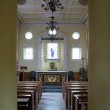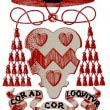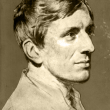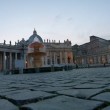Obedience and Faith
 In proportion as a man believes,
In proportion as a man believes,
 In proportion as a man believes,
In proportion as a man believes,
 There is nothing like the blessedness of feeling oneself in God’s hands,
There is nothing like the blessedness of feeling oneself in God’s hands,
 There is a great difference between believing
There is a great difference between believing

25th February 1838
“Though I have all Faith, so that I could remove mountains, and have no Charity, I am nothing.”
1 Cor. 13: 2.
I suppose that all thoughtful readers of the chapter from which these words are taken, have before now been struck with surprise at the varied characteristics which are there ascribed to the excellent grace called love, or charity. What is charity? St. Paul answers, by giving a great number of properties of it, all distinct and special. It is patient, it is kind, it has no envy,

“Wherefore seeing we also are compassed about with so great a cloud of witnesses, let us lay aside every weight, and the sin which doth so easily beset us, and let us run with patience the race that is set before us.” Heb. 12. 1.
The warning and consolation given by the Apostle to the Hebrews, amid their sufferings for the truth’s sake, were as follows: they were to guard against unbelief, that easily-besetting sin under temptation, chiefly, and above all, by “looking unto Jesus, the Author and Finisher of faith;” but, besides this, a secondary stay was added. So glorious and holy is our Lord, though viewed in His human nature, so perfect when He was tempted, so heavenly even upon earth, that sinners, such as we are, cannot endure the sight of Him at first.

Rome-Littlemore, June 2013
Dear Newman Friends,
Blessed John Henry Newman once commented in a talk: “Truth is never enforced except at the sacrifice of its propounders” (Lectures on the Present Position of Catholics in England, London 1857, 403). This was not just a pious saying for this great English convert, but

Fr. Hermann Geissler FSO
There is no doubt that John Henry Newman (1801–1890) belongs among the most significant thinkers of the modern age. In his Christmas address to the Roman Curia in 2010, Benedict XVI. spoke of Newman – whom he beatified earlier that year on September 19th – and emphasized Newman’s prophetic significance in our own day: “Why was he beatified?

Dr. Brigitte Maria Hoegemann FSO
Long before the Anglo-Catholic Oxford don actually saw the city, its name must have resonated with John Henry Newman, evoking not just images of the ancient city, kingdom, republic and empire, its history of three thousand years, its rise and the fall, but also its huge claim to power and its unique culture of antiquity both pagan and Christian. Rome was not only
 the tests of our glorious contemplations…
the tests of our glorious contemplations…
 Let us try to accustom ourselves to this view of the subject. The whole Church, all elect souls, each in its turn, is called to this necessary work. Once it was the turn of others, and now it is our turn. Once it was the Apostles’ turn. It was St. Paul’s turn once. He had all cares on him all at once; covered from head to foot with cares, as Job with sores. And, as if all this were not enough,
Let us try to accustom ourselves to this view of the subject. The whole Church, all elect souls, each in its turn, is called to this necessary work. Once it was the turn of others, and now it is our turn. Once it was the Apostles’ turn. It was St. Paul’s turn once. He had all cares on him all at once; covered from head to foot with cares, as Job with sores. And, as if all this were not enough,